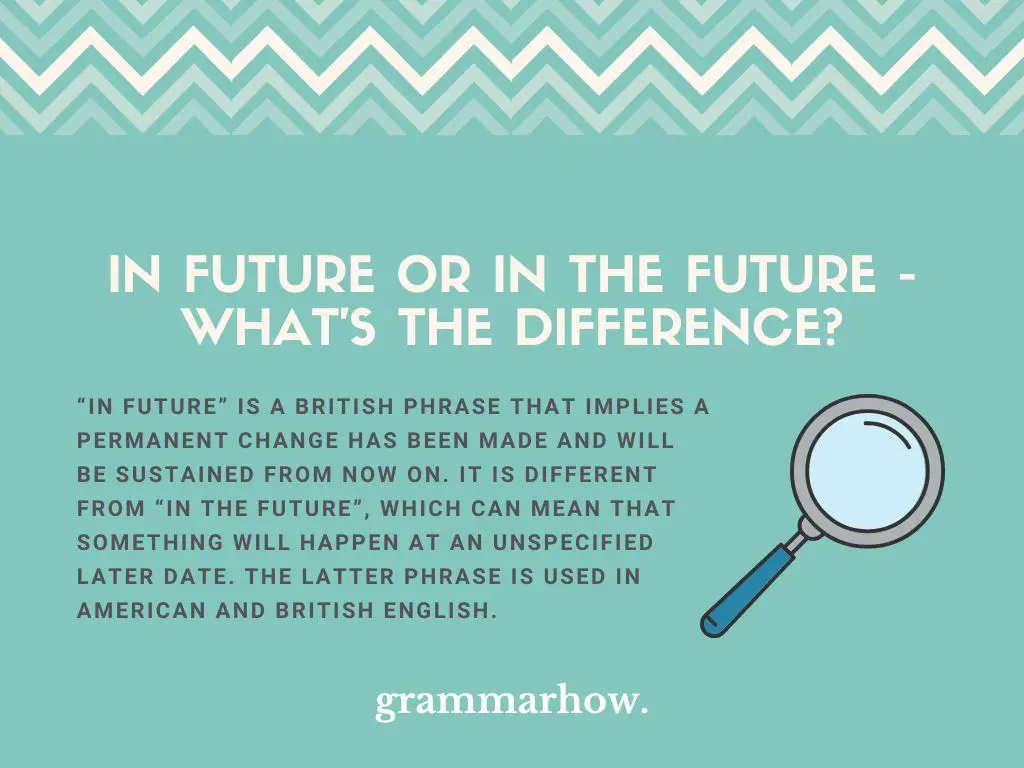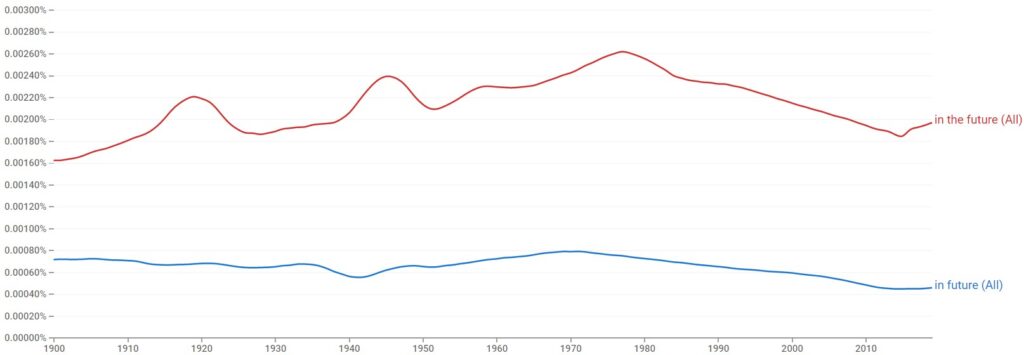Have you encountered the phrase “in future” and wondered whether it’s correct and different from “in the future”?
Well wonder no more: we’re here to provide all the answers that you need. Read on to find out exactly how and when you can say “in future”.
In Future or In the Future – What’s the Difference?
“In future” is a British phrase that implies a permanent change has been made and will be sustained from now on. It is different from “in the future”, which can mean that something will happen at an unspecified later date. The latter phrase is used in American and British English.

In writing, you would only use “in future” to mean “from now on”.
- In future, I will use the phrase in future.
This sentence, to a British reader, will be understood to mean that the speaker has made a permanent commitment to the phrase “in future”, forsaking all others, as long as they both shall live, etc., etc.
- In the future, I will use the phrase in future.
This sentence can imply the same meaning, but it is less concrete. It could just mean that the speaker plans on using the phrase “in future” at some point, but they’re not going to delete their dating profiles yet.
In America, the phrase “in future” isn’t generally used and will be perceived as incorrect grammar. To achieve the same unambiguous meaning, you could replace it with one of the below phrases:
- From now on
- From this point
- Hereafter
In Future
In British English, “in future” serves the same purposes as saying “from now on”. It indicates a commitment to changing something forever. So, not a phrase to be used lightly…
It is a commonly used expression and won’t turn any heads when writing for a British audience. However, The Cambridge Dictionary notes that it is only common in the UK and that, in the US, they would normally say “in the future”.
Let’s look at how you might use “in future” in a sentence (these all work grammatically if you’re a British person or just pretending to be one online):
- In future, he was going to do his best to avoid Americans at all costs.
- She would try and keep in mind that crossing the road is sometimes illegal in America in future.
- “In future,” they said to their friends, “we’ll ideally not get arrested while on holiday”.
Many English words and phrases have their roots in Latin. The term “in futuro” is the Latin equivalent of “in future” and follows the same grammatical structure – no “the”! That’s just a fun fact for any nerds reading this article. You’re welcome.
In the Future
“In the future” is a phrase that tells us something is going to happen at an unspecified point, somewhere further forward in time. It is also used to mean that something is going to happen continuously, from this point onwards.
Here are some examples of how you can use “in the future” to mean “at an unspecified point”:
- We should totally go for coffee sometime in the future; I’ll call you.
- In the future, I’m sure you’ll look back on that time you got arrested in America and laugh!
- Maybe I’ll hang out with her in the future, it’s just all she talks about is how mad it is that you can get arrested for crossing the road in America.
Now, here’s how you can use it to mean “from this point onwards”:
- In the future, please don’t laugh at my America story; it’s very traumatic to me.
- In the future, we will just go on holiday within the UK.
In British English, you can omit “the” and just say “in future” when you mean “from this point onwards”. This structure doesn’t mean “at an unspecified point”.
In fact, Merriam-Webster defines “in future” as “from now on: from this time onward”. It also notes that this is a British phrase – it’s not one that will be familiar to American readers and could just appear incorrect.
Which is Used the Most?
The phrase that is used the most is “in the future”.
If we check the Google Ngram Viewer, we can see that “in the future” has consistently outperformed “in future” by a large margin. Bad luck, “in future”.

This is probably due to “in future” being only a British phrase, whereas both the Brits and the Americans will be using “in the future”.
Final Thoughts
“In the future” is a phrase used across English-speaking countries. It means either “at some point” or “from now on”. Conversely, “in future” is a phrase used in Britain which only means “from now on”. It shouldn’t be used in writing for American audiences, as it would be confusing.

Martin holds a Master’s degree in Finance and International Business. He has six years of experience in professional communication with clients, executives, and colleagues. Furthermore, he has teaching experience from Aarhus University. Martin has been featured as an expert in communication and teaching on Forbes and Shopify. Read more about Martin here.
